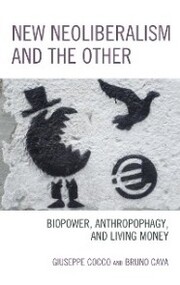Detailansicht
New Neoliberalism and the Other
eBook - Biopower, Anthropophagy, and Living Money
ISBN/EAN: 9781498526678
Umbreit-Nr.: 200784
Sprache:
Englisch
Umfang: 254 S.
Format in cm:
Einband:
Keine Angabe
Erschienen am 19.02.2018
Auflage: 1/2018
E-Book
Format: EPUB
DRM: Adobe DRM
- Zusatztext
- <span><span>The exhaustion of neoliberal globalization is marked by three great tendencies or inflections: the first is the scornful failure of the South-American attempt to construct a neo-developmentalist exit; the second is the increasingly unavoidable Chinese-effect macro and micro dynamics within globalization; the third is the combination of austerity policies and monetary emissions (</span><span>Quantitative Easing</span><span>) that characterize, for instance, the financial conduct of the Central European Bank. The dramatic failure to renew traditional state interventionism in the sphere of Pink Tide in Latin American politicsin particular with the violent recession of the biggest economy on the Latin American continent, Brazilshows and confirms that the escape from neoliberal regulation does not pass through the return of the traditional role of the state. At the same time, the Chinese economy came to play a double role. On one hand, it appears to represent the great and irreversible novelty of neoliberal globalization, particularly when our point of perspective is South America. While almost nothing remains of the legacy of the center-left-leaning regimes, the last South American decade appears to have genuinely been a Chinese decade. The Chinese advance is seen, especially by voices of the critical globalization studies, as a new outside of Empire, as something that stands for an alternative path, even if it is nothing more than an old new outside. Meanwhile, the role played by the financial sector continues to be regarded per se as the fundamental problem of contemporary capitalism. For some, this is a case of a deviation from an otherwise good capitalism, the misleading result of a fictitious and unreal sphere (as opposed to the sphere of material economy, of good old bosses and hard workers), while for others, it is a case of one of the moral characteristics of Western civilization: infinite debt, and capitalism happens to be its modern drift.</span></span>
- Kurztext
- <span><span>This book proposes a shift in the very concept of neoliberalism as an ambivalent product of subjectivity. It is not resolved in dichotomies between the included and excluded, interior and exterior, capitalist and noncapitalist. Neoliberalism operates in blurred lines, through flexible structures, and amid internal gradients and varying tensions.</span></span>
- Autorenportrait
- <span><span>Bruno Cava</span><span> is associate researcher in the Universidade Nômade network.<br></span></span><br><span><span>Giuseppe Mario Cocco</span><span> is professor at the Federal University of Rio de Janeiro and the Brazilian Institute of Information in Science and Technology.</span></span>
